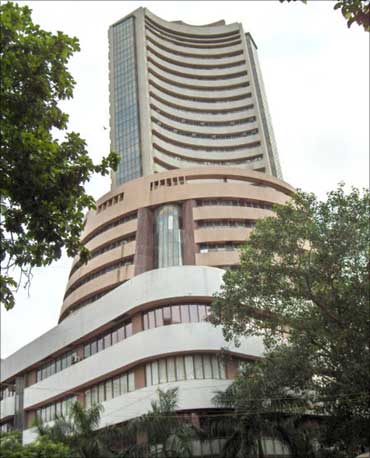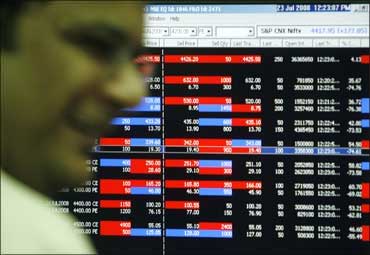
Before the year is over, Sensex, which comprises the 30 most-traded shares on Bombay Stock Exchange, will begin to trade on Deutsche Borse, Europe's largest stock exchange.
The stated intention of the move is to draw the attention of large investors abroad to the happening Indian stock markets.
The unstated intention is to regain market share and mind space from arch rival National Stock Exchange. Nifty, the NSE index of top 50 shares, is already traded in the United States and Singapore.
BSE, which traces its history to 1875, has been hammered black and blue by NSE which was born as a "child of competition" in 1992. BSE's share of stock trading, cash as well as derivatives, has fallen from 45 per cent in 2000 to 12 per cent in 2005 and just 6 per cent now.
NSE has a virtual monopoly over derivatives (futures and options) trading in the country. This is a vicious cycle.
In stock markets, liquidity breeds liquidity. Because of higher liquidity, the bid-ask spreads (the difference between the best buy and best sell prices of any scrip) on NSE are lower, which brings down the transaction costs for brokers.
So, NSE's position as the preferred stock exchange gets strengthened day after day, week after week.
...

M R Mayya, a former executive director of BSE, says that the securities scam of 2001, wherein some BSE officials were accused of leaking market-sensitive information, was the final straw.
"That was the point when BSE began to lose out and people moved on to NSE," says he.
More than that, BSE was unable to read the trend correctly when derivatives trading started in the country in June 2000. NSE, with its nationwide reach, was able to capitalise on it better.
The daily volumes in the derivatives segment are now close to Rs 90,000 crore (Rs 900 billion) - way above the Rs 20,000 crore (Rs 200 billion) in the cash segment - and almost the entire trade is carried out on NSE.
Moreover, NSE has put in place strong system and compliance processes that have ensured that the exchange never suffered on account of any payment issue. Even when the market went through tough times in 2008, thanks to the liquidity crunch, there was never any stoppage.
Equity trading is big business. Transactions have grown at a compounded annual rate of 46 per cent in the last 14 years.
The future too looks good. Analysts at IDFC SSKI estimate that with improving penetration, volumes could grow at 12 per cent per annum till 2014 and will reach the size of $5.3 trillion (Rs 2,46,10,000 crore) per annum.
Operating profit margins of a stock exchange can be as high as 60 per cent. The stakes are too big for BSE to throw in the towel. It has a gameplan ready to recover lost ground.
...

BSE, for a long time, was seen as a club of a select few and a largely western-India-oriented exchange.
"Repositioning ourselves as a national exchange with professionals and persons of eminence guiding us has been the first step," says BSE managing director & CEO Madhu Kannan.
Before he took up this assignment in June last year, Kannan was the managing director of Bank of America Merrill Lynch. He has also worked as a senior executive with NYSE Euronext.
Kannan's gameplan:
Revival plan
Kannan's first step was to build a world-class A-team. Thus, James Shapiro has joined from NYSE as head of market development; Sayee Srinivasan, who was with the Chicago Mercantile Exchange, has come on board to lead the product strategy team; Nehal Vora, who has worked with DSP Merrill Lynch as well as the Securities and Exchange Board of India, has taken over planning and policy; and Ashish Chouhan from Reliance Industries is the deputy CEO S Ramadorai, the former CEO of Tata Consultancy Services, has taken over as the BSE chairman.
The message from his appointment is that the exchange wants to build its technological edge. "The strong management team is a definite advantage for BSE, and this a huge change from the past," says Mayya.
...

The next step was to induce brokers to trade on BSE. While NSE took the lead here by tying up with the regional stock exchanges, BSE has slashed its membership fees from Rs 1 crore (Rs 10 million) to Rs 10 lakh (Rs 1 million).
As a result, Kannan claims, 1,600 applications have come for membership from all over the country.
"This way we can establish our pan-India presence," says he. This has also helped him bridge the gap in active members with NSE, which had reached as high as 40 per cent.
With a net worth of Rs 1,890 crore (Rs 18.9 billion) as on March 31, 2010, this was an affordable gamble for BSE to gain volumes. Half the new members are also members of NSE. As arbitrage between NSE and BSE is a large business, this could help Kannan ramp up his volumes.
With more membership, Kannan hopes to get better volumes in the derivatives segment in the days to come. Over 50,000 derivative quotes are available on the BSE screen. Kannan has launched software for derivatives called Fast Trade.
It is, he claims, cheaper than NSE's NOW but easier for brokers to connect. Going forward, Kannan wants to launch spot and futures trading on the same screen.
Through its strategic stake in the United Stock Exchange, BSE will offer currency derivatives and interest rate derivatives. But will this be enough to outpace NSE? It sure will be tough.
NSE has taken the lead in futuristic products like algorithmic trading in which BSE's share is minimal. According to Kannan, this is because NSE does not allow such trades to be executed on BSE by common members.
Stock exchanges, the world over, offer an ever-widening bouquet of services to their members along with cutting-edge technology. This is what determines the success or failure of an exchange.
Kannan wants to tackle this challenge by diversifying the BSE portfolio, apart from increasing the depth in existing verticals.
...

Thus, BSE has taken a stake in the National Power Exchange, which will trade in power units along with state-owned utilities NTPC and NHPC.
Kannan claims that BSE's share in the market for initial public offers (IPOs) has improved significantly. More than 75 per cent of the companies that list in India choose BSE as the designated exchange.
The listing of the Indian Depository Receipts of Standard Chartered gave BSE's image a boost. BSE also has a dominant share in distribution of mutual funds through stock exchanges.
In addition, BSE has increased its stake from 38 per cent to 54 per cent in Central Depository Services Ltd, a clearing corporation, which will enable it to process transactions at a lower cost and offer speedier services. (NSE, in turn, has picked up over 25 per cent in National Securities Depository Ltd.)
Depository fees form 35 to 40 per cent of the transaction costs; a stock exchange can reduce these costs by sharing common processes and assets with the depository. Also on the anvil could be a separate trading platform for small and medium enterprises, though such experiments in the country have failed miserably before.
Technology first
Kannan believes that the role of a stock exchange has transformed from transactions to a technology provider. So, what's coming next?
"Mobile phone-based trading and dealing is being looked at very closely, and we have made presentations to the regulator on this topic," says Kannan.
The potential to grow sure is huge. While there are just 15 million demat accounts in the country, there are over 600 million mobile phones.
...

BSE had recently acquired Marketplace Technology, a firm that specialises in equity trading related software. It has 150 customers including big names like Reliance Money, ICICI Direct, Motilal Oswal, Karvy and Anand Rathi Securities.
Its front office solution has been purchased by more than 100 members of BSE. The acquisition has helped Kannan establish BSE's presence in the technology space. NSE, in turn, has an active information technology IT division that has built significant strengths in this area.
A big business for stock exchanges nowadays is data. Thus, exchanges like the London Stock Exchange and NYSE Euronext get only around half their revenues from transactions - the other half comes from data-related services.
BSE, with a strong brand and huge pools of historical data, will look at earnings from its data-related services and also from training.
"I tell my team that while we settle trades, we also do a lot of other things," says Kannan.
There are two problems here. One is that NSE is playing the same game. "What we have tried to do ever since NSE started is to see what the market needs, validate it against market voices, and try and build that to provide the best service at the lowest possible price. If that results in higher market share, it's good for us," NSE managing sirector & CEO Ravi Narain says.
Two, not everybody is sure that there will be much demand for the historical data lying with BSE. The demand in the country is for live data feed and not historical data, unlike in the West, say skeptics.
BSE has been valued at $1 billion (Rs 4,700 crore). It could list for trading in the future, once the Bimal Jalan Committee comes out with relevant guidelines.
As a precursor, it has started publishing its business results. (The net profit for 2009-10 was Rs 213 crore (Rs 2.13 billion) on a turnover of Rs 485 crore (Rs 4.85 billion).
Will it cut ice with traders and brokers? One thing if for sure: Whenever the listing guidelines are in place, NSE won't be left far behind.